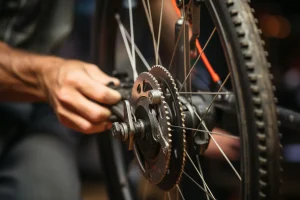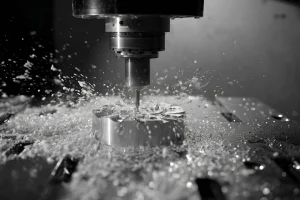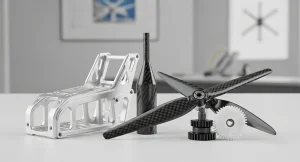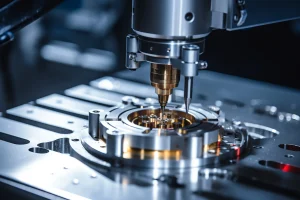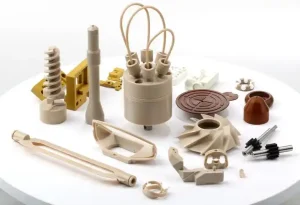Introduction
In contemporary manufacturing, the demand for non – standard titanium alloy parts customized is on the rise. Titanium alloy, known for its high strength – to – weight ratio, excellent corrosion resistance, and ability to withstand extreme temperatures, has found its way into a wide range of industries. From aerospace to medical devices, and from automotive to marine applications, non – standard titanium alloy parts play a pivotal role.
The uniqueness of non – standard titanium alloy parts lies in their ability to meet specific requirements that off – the – shelf components simply cannot. Whether it’s a complex shape for a new aircraft engine component or a precisely – engineered part for a medical implant, customization ensures optimal performance. This article will explore the world of non – standard titanium alloy parts customized, including the manufacturing processes, their applications, and the benefits they bring to various industries.
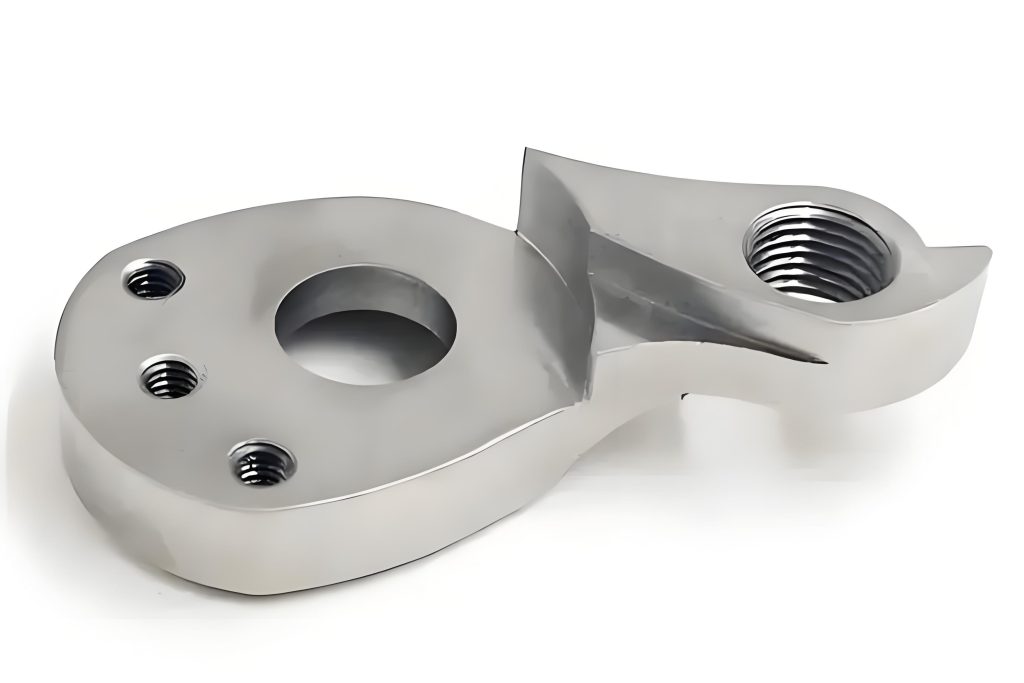
Understanding Non – standard Titanium Alloy Parts
Definition and Characteristics
Non – standard titanium alloy parts refer to components that are designed and manufactured according to specific, unique requirements, deviating from the commonly – accepted standard specifications. These requirements could stem from novel product designs, extreme operating conditions, or the need for enhanced performance in a particular application.
Titanium alloys, in general, are a class of metals renowned for their exceptional properties. They possess a high strength – to – weight ratio, which means they are incredibly strong while remaining relatively lightweight. This characteristic makes them ideal for applications where weight reduction is crucial without sacrificing structural integrity, such as in aerospace.
Their corrosion resistance is another remarkable feature. Titanium alloys can withstand harsh environments, including exposure to corrosive chemicals, saltwater, and high – humidity conditions. This makes them suitable for use in marine applications, chemical processing plants, and medical implants, where the material must maintain its integrity over an extended period.
Moreover, titanium alloys exhibit excellent heat resistance, allowing them to retain their mechanical properties at elevated temperatures. This property is vital in industries like aerospace and automotive, where components are often subjected to extreme heat during operation.
When compared to standard parts, non – standard titanium alloy parts offer greater flexibility in design. They can be customized to fit specific geometries, tolerances, and performance criteria. For instance, a non – standard part might have a more complex shape, tighter dimensional tolerances, or unique surface finish requirements to meet the exact needs of a particular system or application.
Applications Across Industries
- Aerospace Industry
- In aircraft manufacturing, non – standard titanium alloy parts are used in critical components such as engine compressor blades, turbine disks, and structural frames. For example, the engine compressor blades need to be precisely engineered to withstand high rotational speeds, extreme temperatures, and aerodynamic forces. Non – standard design allows for the optimization of blade shape, thickness, and material distribution to enhance efficiency and durability.
- In spacecraft, titanium alloy parts are used in the construction of the outer shell, fuel tanks, and landing gear. The ability of titanium alloys to withstand the harsh environment of space, including radiation and extreme temperature variations, makes them indispensable. A custom – designed titanium alloy fuel tank can be tailored to fit the unique shape and volume requirements of a spacecraft, ensuring efficient fuel storage and transfer.
- Medical Field
- Medical implants are a significant application area for non – standard titanium alloy parts. Hip and knee replacements, dental implants, and spinal fixation devices often require customized titanium components. For hip replacements, the implant needs to be precisely shaped to fit the patient’s anatomy, ensuring proper joint function and minimizing the risk of rejection. Titanium’s biocompatibility, which allows it to integrate well with the human body without causing an adverse immune response, makes it the material of choice for such applications.
- Surgical instruments also benefit from titanium alloy’s properties. Non – standard titanium alloy surgical tools can be designed with specific shapes and sizes for minimally invasive procedures. Their lightweight nature reduces operator fatigue during long – duration surgeries, while their corrosion resistance ensures a long service life, even after repeated sterilization processes.
- Automotive Sector
- In high – performance cars, non – standard titanium alloy parts are used to improve performance and fuel efficiency. Titanium alloy connecting rods, for example, are lighter than their traditional steel counterparts, reducing the reciprocating mass in the engine. This allows the engine to rev more freely, resulting in increased power output and better fuel economy.
- Suspension components such as titanium alloy springs can also enhance a vehicle’s handling. Their high strength and corrosion resistance ensure they can withstand the stresses of daily driving and various road conditions, while their lightweight design helps to improve the vehicle’s overall weight distribution, leading to better stability and responsiveness.
- Marine Industry
- Ships and offshore structures rely on non – standard titanium alloy parts to withstand the corrosive effects of seawater. Propellers, for instance, can be made from customized titanium alloys to improve efficiency and durability. The unique shape and material composition of a non – standard titanium alloy propeller can enhance its hydrodynamic performance, reducing cavitation and increasing thrust.
- Titanium alloy is also used in the construction of underwater pipelines and fittings. These components need to be corrosion – resistant and able to withstand high pressures. Non – standard design allows for the creation of pipeline joints and fittings that are specifically tailored to the installation requirements, ensuring a secure and leak – free connection.
- Industrial Machinery
- In the manufacturing of industrial machinery, non – standard titanium alloy parts are used in applications where high strength, corrosion resistance, and precision are required. For example, in chemical processing plants, titanium alloy valves and pumps can be customized to handle corrosive chemicals. The unique design of these parts can ensure proper flow control and prevent leakage, safeguarding the integrity of the production process.
- In the electronics industry, titanium alloy parts are used in semiconductor manufacturing equipment. These parts need to be precisely machined to meet the tight tolerances required for semiconductor production. Non – standard titanium alloy components can be designed to withstand the high – temperature and high – vacuum environments present in semiconductor manufacturing processes.
The Customization Process
Design Phase
The design phase is the cornerstone of creating non – standard titanium alloy parts. It begins with in – depth communication between the manufacturer and the client. Understanding the client’s requirements, such as the part’s intended function, operating environment, and any specific performance targets, is crucial. For example, if the part is for a high – speed rotating component in a turbine, the design must account for factors like centripetal forces and heat dissipation.
Advanced design software, such as CAD (Computer – Aided Design) and CAM (Computer – Aided Manufacturing), is employed. CAD allows for the creation of detailed 3D models of the part, where every dimension, curve, and surface can be precisely defined. Designers can simulate various scenarios, such as stress analysis and fluid flow, to optimize the part’s design before production. CAM software then takes the CAD model and generates the instructions for the manufacturing process, ensuring that the design can be translated accurately into a physical part.
Material Selection
Selecting the right titanium alloy material is a critical step. Different titanium alloys have distinct properties, and the choice depends on the part’s application and performance requirements. For applications where high strength and heat resistance are essential, alloys like Ti – 6Al – 4V are often preferred. This alloy, which contains 6% aluminum and 4% vanadium, offers a good balance of strength, toughness, and heat resistance, making it suitable for aerospace components like engine parts.
In medical applications, biocompatibility is a top priority. Titanium alloys that are specifically designed to be non – reactive with the human body, such as pure titanium (Grade 1 – 4) or certain low – alloy content titanium alloys, are used. These materials can integrate well with the body’s tissues, reducing the risk of rejection.
For marine applications, where corrosion resistance is crucial, alloys with enhanced resistance to seawater, such as titanium – nickel – molybdenum alloys, might be considered. The material selection process also involves evaluating factors like cost, availability, and machinability. A balance must be struck between achieving the desired performance and keeping the production cost within a reasonable range.
CNC Machining with Rapidefficient
Rapidefficient plays a significant role in the CNC (Computer Numerical Control) machining of non – standard titanium alloy parts. CNC machining is a highly precise manufacturing process that uses pre – programmed computer software to control the movement of machine tools.
One of the key advantages of Rapidefficient in CNC machining is its high precision. Titanium alloy parts often require tight tolerances, especially in industries like aerospace and medical. Rapidefficient’s advanced CNC machines can achieve tolerances as low as ±0.001 inches, ensuring that each part meets the exact specifications. This precision is crucial for components like aircraft engine parts, where even a slight deviation can lead to performance issues or safety risks.
Efficiency is another area where Rapidefficient stands out. The company’s state – of – the – art CNC machines are equipped with high – speed spindles and advanced control systems, allowing for faster machining times. For example, in the production of complex titanium alloy parts with multiple features, Rapidefficient can complete the machining process in a significantly shorter time compared to traditional machining methods. This not only reduces production time but also lowers costs, making it an attractive option for clients who need their parts quickly.
Moreover, Rapidefficient’s CNC machining capabilities can handle a wide range of part geometries. Whether it’s a part with intricate curves, deep cavities, or complex multi – axis features, their machines can execute the machining operations with ease. The flexibility of CNC machining allows for the production of one – off prototypes as well as large – scale production runs, catering to the diverse needs of clients.
Quality Control and Inspection
Quality control is an integral part of the manufacturing process for non – standard titanium alloy parts. At every stage of production, from raw material inspection to the final machining operations, strict quality checks are carried out.
Upon receiving the titanium alloy raw materials, they are inspected for chemical composition and physical properties. Spectroscopic analysis is often used to verify the alloy’s chemical makeup, ensuring that it meets the specified standards. Physical inspections, such as measuring the dimensions of bars or sheets, are also performed to ensure they are within the acceptable tolerances.
During the machining process, in – process inspections are conducted regularly. Precision measuring tools, such as coordinate measuring machines (CMMs), are used to check the dimensions of the part as it is being machined. CMMs can accurately measure the part’s length, width, height, and other geometric features, comparing them to the design specifications. Any deviations can be detected early, allowing for adjustments to the machining process to correct the issue.
After the machining is complete, a final inspection is carried out. Visual inspections are performed to check for surface finish, cracks, or other visible defects. Non – destructive testing methods, such as ultrasonic testing and eddy current testing, are used to detect internal defects that may not be visible to the naked eye. These tests can identify flaws like voids, inclusions, or improper bonding within the titanium alloy.
Only parts that pass all the quality control and inspection procedures are considered suitable for delivery to the client. This rigorous approach to quality ensures that clients receive non – standard titanium alloy parts that meet the highest standards of performance and reliability.
Advantages of Choosing Rapidefficient for CNC Machining
Precision and Accuracy
Rapidefficient is renowned for its unwavering commitment to precision and accuracy in CNC machining of non – standard titanium alloy parts. The company’s state – of – the – art CNC machines are equipped with advanced positioning systems that can achieve micron – level tolerances. For example, in the production of aerospace components like turbine blades, where even the slightest deviation can lead to catastrophic consequences, Rapidefficient’s machining capabilities ensure that each blade is manufactured to within ±0.001 inches of the design specifications.
This high level of precision is achieved through a combination of factors. Firstly, the CNC machines are calibrated regularly using precision measuring instruments to maintain their accuracy over time. Secondly, the programming of the machining operations is carried out with meticulous attention to detail. The engineers at Rapidefficient use advanced CAM software to generate toolpaths that optimize the machining process, minimizing errors and ensuring consistent results.
Moreover, Rapidefficient’s quality control team conducts in – process inspections at multiple stages of the machining process. This includes using coordinate measuring machines (CMMs) to verify the dimensions of the part as it is being machined. If any deviation from the specified tolerances is detected, the machining process is immediately adjusted to correct the issue, guaranteeing that the final part meets the highest standards of precision.
Efficiency and Short Lead Times
In today’s fast – paced business environment, time is of the essence. Rapidefficient understands this and has optimized its CNC machining processes to offer clients short lead times without compromising on quality. The company’s modern CNC machines are equipped with high – speed spindles and advanced control systems that enable rapid material removal rates.
For instance, when machining a complex non – standard titanium alloy part with multiple features, Rapidefficient’s CNC machines can complete the rough machining operations in a significantly shorter time compared to traditional machining methods. This is because the high – speed spindles can rotate at speeds of up to 20,000 RPM, allowing for faster cutting and reduced cycle times.
In addition to the high – speed equipment, Rapidefficient has streamlined its internal processes to ensure a smooth and efficient production flow. The company has an experienced team of engineers and technicians who can quickly analyze the design requirements of a part and develop a machining plan. This efficient planning process, combined with the use of advanced software for toolpath generation, helps to minimize setup times and reduce overall production lead times.
Furthermore, Rapidefficient maintains a well – stocked inventory of commonly used titanium alloy materials. This means that once a client’s order is received, the company can quickly source the raw materials and begin the machining process, further reducing the time it takes to deliver the finished parts.
Cost – effectiveness
Cost – effectiveness is a key consideration for businesses when choosing a CNC machining service provider, and Rapidefficient offers excellent value for money. The company achieves cost savings through several means.
Firstly, by optimizing the machining processes, Rapidefficient reduces the amount of time and materials required to produce non – standard titanium alloy parts. For example, through the use of advanced CAM software, the company can generate toolpaths that minimize material waste. The software analyzes the part’s geometry and determines the most efficient way to cut the material, reducing the amount of scrap generated during the machining process.
Secondly, Rapidefficient’s high – efficiency CNC machines consume less energy compared to older – generation machines. This not only helps to reduce the company’s environmental impact but also results in lower energy costs, which are ultimately passed on to the clients.
In addition, the company’s experienced team of engineers can often suggest design modifications that can improve the manufacturability of a part without sacrificing its performance. These modifications can simplify the machining process, reducing the number of operations required and lowering the overall production cost.
Moreover, Rapidefficient offers competitive pricing without compromising on quality. The company’s pricing structure is transparent, and clients can be assured that they are getting a fair deal. By choosing Rapidefficient for CNC machining of non – standard titanium alloy parts, businesses can achieve high – quality results at a reasonable cost, enhancing their competitiveness in the market.
Customer Success Stories
Case 1: Aerospace Innovation
A leading aerospace company was working on developing a revolutionary aircraft engine design that required non – standard titanium alloy parts with unprecedented precision and performance capabilities. The parts needed to withstand extreme temperatures, high rotational speeds, and complex aerodynamic forces.
They turned to Rapidefficient for the CNC machining of these critical components. Rapidefficient’s team of engineers worked closely with the aerospace company’s design team to understand the exact requirements. Using advanced CAD/CAM software, they optimized the design for manufacturability while ensuring it met all the performance criteria.
The CNC machining process at Rapidefficient was carried out with utmost precision. The high – speed spindles and advanced control systems of their CNC machines allowed for the efficient machining of the complex titanium alloy parts. The tight tolerances required for the engine components, such as compressor blades and turbine disks, were consistently achieved.
As a result, the aerospace company was able to successfully test their new engine design. The non – standard titanium alloy parts provided by Rapidefficient contributed to improved engine efficiency, reduced weight, and enhanced overall performance. This innovation not only gave the aerospace company a competitive edge in the market but also opened up new possibilities for future aircraft designs.
Case 2: Medical Breakthrough
A medical device startup was developing a novel spinal fixation device that needed to be customized to fit each patient’s unique spinal anatomy. The device required non – standard titanium alloy parts that were not only biocompatible but also had precise mechanical properties to ensure long – term stability and effectiveness.
Rapidefficient was selected as the machining partner due to its reputation for precision and quality. The design phase involved detailed 3D modeling of the spinal fixation device based on patient – specific data. Rapidefficient’s engineers used this data to create a customized machining plan.
During the CNC machining process, the company’s high – precision machines were able to produce the complex shapes of the titanium alloy parts with micron – level accuracy. The strict quality control measures ensured that each part was free from defects and met the highest standards of biocompatibility.
The medical device startup was able to conduct successful clinical trials with the spinal fixation device. The customized non – standard titanium alloy parts provided by Rapidefficient played a crucial role in the device’s ability to provide better support and alignment for patients’ spinal columns. This breakthrough in medical technology has the potential to improve the lives of countless patients suffering from spinal disorders.
Conclusion
In conclusion, non – standard titanium alloy parts customized are indispensable in modern manufacturing. Their ability to meet unique requirements across various industries, from aerospace to medical, is a testament to their importance. The customization process, from design to quality control, is a complex yet crucial journey that ensures the production of high – performance parts.
When it comes to CNC machining of non – standard titanium alloy parts, Rapidefficient stands out as a reliable partner. With its precision, efficiency, cost – effectiveness, and a track record of successful customer projects, Rapidefficient offers a comprehensive solution for all your non – standard titanium alloy part machining needs. Whether you are a startup looking to innovate or an established company aiming to enhance product performance, Rapidefficient has the expertise and capabilities to deliver outstanding results.
If you are in need of high – quality non – standard titanium alloy parts, don’t hesitate to reach out to Rapidefficient. Their team of experts is ready to assist you in bringing your design concepts to life with precision and speed.

